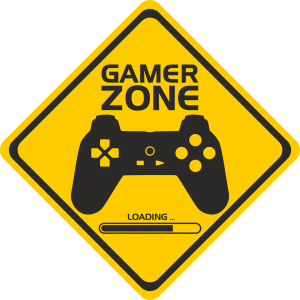
Take a look around you. How many devices do you see? A phone, a laptop, a desktop computer? What about devices you can play video games on? A television consul, a phone, a handheld device like a Nintendo Switch? If you don’t see any gaming devices, think about your friend or family members, your neighbor, your coworkers, anybody in your network that may have one (or more). If you are of a certain generation, perhaps you can recall a moment in time where you had to go to an arcade or your friend or family members house to play your favorite video game. If you are of a different generation (we are talking to you Gen Z!), maybe you don’t know what it is like to not have constant accessibility to your favorite online game. Regardless of your own personal history, one thing is certain: video games are now woven into the fabric of our day-to-day life, even if we don’t know they are. From large corporations ‘gamifying’ HR policies and other educational experiences for employees, to schools using video games as rewards for ‘good’ behavior, video games are here to stay. From single player puzzle games to multi-player shooter or role play simulations, to strategic survival games, the options are endless.
Thanks to technology advancements and internet accessibility, video games are easier to play today compared to any other time before. Video games went from something only found in arcade venues to something that was easily accessed at home, school, and at work, across multiple devices. And the world adapted accordingly. For instance, Esports tournaments have emerged for amateurs and professional gamers alike to compete against each other across a range of games, from League of Legends World Championship and Halo Championship Series to Call of Duty World League and Fortnite World Cup. Esports tournaments are played on consoles or computers, and are held over the internet or at a physical location. Spectators join each match, watching and cheering on their favorite gamer, similar to traditional sports. The grand finale or championship game are over the top, often played in large venues similar to stadiums for events like the Super Bowl or rock concerts. In 2019, while global revenues from Esports exceeded $1 billion USD, the winner of the Fortnite World Cup received $3million of the $30million in prize money. The winner, a 16-year-old from Pennsylvania.
Esports aren’t only for amateur players. In 2016, video gaming was recognized as a collegial sport wherein gamers could be recruited by college scouts for scholarships based on gaming abilities, accurately conveying gameplay, being a team player, and showing sportsmanship. For college students interested in video games but whose skills may be more amateur than professional, they can also major in Esports management at some colleges to prepare for a career in Esports.

While playing video games is for most an enjoyable pastime, hobby, or way to make a living, emerging research and prevalence data suggests that for some it can become debilitating and result in negative quality of life. The World Health Organization recognizes problematic video game use as “a pattern of persistent or recurrent gaming behavior, impaired control over gaming, increasing priority given to gaming over other activities to the extent that gaming takes precedence over other interests and daily activities, and continuation or escalation of gaming despite the occurrence of negative consequences”. It is estimated that problematic video gaming impacts 3.05% of people worldwide (Stevens et al., 2020), and is correlated with impaired decision making, impulsive or low levels of self-control (Rho et al., 2018), increased distress, and poor quality of sleep (Wong et al., 2020). However, professionals must remain vigilant to the possibility of false positives due to a lack of evidence surrounding the underlying mechanism that contributes to the presentation of problematic video gaming (van Rooij, et al., 2018). With so much still unknown about this class of behaviors, there is a push to err on the side of caution and not over pathologize gaming use in general (van Rooij, et al., 2018).
Problematic video gaming can however lead to impaired sensitivity to the consequences within the game, particularly losses (Weinstein & Lejoyeux, 2020). This finding is particularly alarming, as it suggests that prolonged exposure can result in the player becoming insensitive to not only the wins in the game, but the losses or negative consequences as well. Such insensitivity to losses can make individuals more susceptible to long term use, as negative consequences such as loss of points or other valuable items both in and out of the game no longer serve as aversive outcomes from video gaming.
One recent characteristic or feature within video games that has been suggested to contribute to problematic video gaming is loot boxes. A loot box is a treasure box of sorts that can be accessed by reaching certain levels or achievements within the game or purchased to obtain rewards set on a probability scale (i.e., 90% chance of getting a low-level reward vs. 10% chance of getting a high-level reward). Some rewards offer aesthetic changes to the character’s clothing or armor, while other rewards provide the gamer with additional tools or weapons that may increase the player’s success in the game. In some multi-player games, a player can watch other players open a loot box and will see what that player receives. Interestingly, about 60% of Google Play and Apple App store video games contain loot boxes (Zendle et al., 2020). Emerging research on loot boxes has identified an association between purchasing loot boxes and video game play frequency and problematic use severity (Li et al., 2019). Countries including Belgium, China, the Netherlands, and the United Kingdom are beginning to implement restrictions on loot boxes to protect gamers (Staub, 2020; Woodhouse, 2021).

Taken together, video games do not appear to be going anywhere; in fact, they are going to continue to become more popular, their use more prevalent, and the outcomes associated with long term use potentially more pervasive. It is imperative that human service fields, such as applied behavior analysis, consider video gaming as a form of entertainment that may also develop into problematic use. Will every gamer develop problematic video game use? More than likely no. However, just like other behavioral ‘addictions’, behavior analysts should be aware of the potential harm that may arise with some gamers. Can we level up our service provision to start to think about video games as more than an activity our clients engage in during a break? Can we think critically about potential warning signs? Should we educate the parents we work with about potential problematic video game use, like how we approach sex education or even anti-drug use education? Some of these questions may not have easy or clear-cut answers. But we should consider them as we continue to work with clients that play video games.
Written by: Alyssa Wilson and Danielle Cohen
References:
Li, W., Mills, D., & Nower, L. (2019). The relationship of loot box purchases to problem video gaming and problem gambling. Addictive behaviors, 97, 27-34.
Rho, M. J., Lee, H., Lee, T. H., Cho, H., Jung, D. J., Kim, D. J., & Choi, I. Y. (2018). Risk factors for internet gaming disorder: Psychological factors and internet gaming characteristics. International journal of environmental research and public health, 15(1), 40.
Stevens, M. W., Dorstyn, D., Delfabbro, P. H., & King, D. L. (2020). Global prevalence of gaming disorder: A systematic review and meta-analysis. Australian & New Zealand Journal of Psychiatry, 55(6), 553-568.
Van Rooij, A. J., Ferguson, C. J., Colder Carras, M., Kardefelt-Winther, D., Shi, J., Aarseth, E., … & Przybylski, A. K. (2018). A weak scientific basis for gaming disorder: Let us err on the side of caution. Journal of behavioral addictions, 7(1), 1-9.
Weinstein, A., & Lejoyeux, M. (2020). Neurobiological mechanisms underlying internet gaming disorder. Dialogues in Clinical Neuroscience, 22(2), 113.
Wong, H. Y., Mo, H. Y., Potenza, M. N., Chan, M. N. M., Lau, W. M., Chui, T. K., … & Lin, C. Y. (2020). Relationships between severity of internet gaming disorder, severity of problematic social media use, sleep quality and psychological distress. International journal of environmental research and public health, 17(6), 1879.
Woodhouse, J. (2021, April 28). Loot boxes in video games. House of commons library. https://commonslibrary.parliament.uk/research-briefings/cbp-8498/
Zendle, D., Meyer, R., Cairns, P., Waters, S., & Ballou, N. (2020). The prevalence of loot boxes in mobile and desktop games. Addiction, 115(9), 1768-1772. 10.111/add.14973
